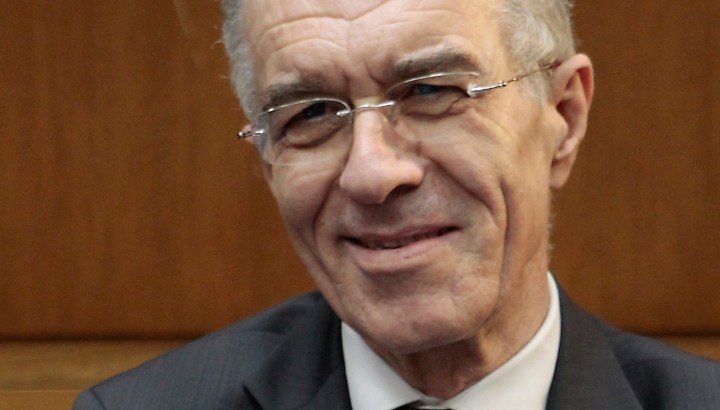Newsdeck
Greek banker once jailed by junta takes on new fight

As a young student, banker Vassilis Rapanos was jailed in one of Greece's most infamous prisons for fighting a military dictatorship. By George Georgiopoulos and Deepa Babington
Four decades later he is facing what may be an even bigger battle as Greece’s new finance minister, charged with negotiating with foreign powers exasperated by the near-bankrupt country’s repeated failure to keep reform pledges.
An economist who advised Greece’s government when it joined the euro zone, the understated Rapanos is regarded by many of his peers as among the best qualified men to lead the fight for the country’s survival in the single currency bloc.
“He is a low-key, consensus builder but has his limits on what he will tolerate and is known to bang his fist on the table when needed,” said one banker who has worked with him closely.
“He has fought battles in his life but is humble.”
Bankers and officials who know him describe him as a reliable, experienced hand known for playing by the rules – traits likely to earn him credibility among European partners suspicious of Greece’s notoriously unreliable political class.
“He is very measured and serious – a man you can trust,” said a senior official in the previous Greek government led by technocrat Lucas Papademos until earlier this year. “He has very good knowledge of how the Greek economy works.”
Rapanos, 64, declined to make any comment before his swearing-in as finance minister, which is expected later this week.
But in a Reuters interview earlier this year at his office at the National Bank of Greece, where he is chairman, the slim, unassuming banker recalled the early 2000s when the country first joined the euro as the golden era of his career.
“The best period of my professional life was when Greece joined the euro and was held up as the example for other countries wishing to join,” he told Reuters at the time.
“Greece was really the good example for newcomers – the Czech Republic, Slovakia. What we failed to do in the last 10 years was to move ahead with all the changes needed to make the economy competitive and put our finances in order.”
SOBER AND CALM
Born on the island of Kos, Rapanos was jailed by Greece’s military junta from 1969 to 1973 in prisons including the notorious Genti Koule in the northern city of Thessaloniki.
He was picked up for being part of a left-wing guerrilla group, police say.
After being freed under an amnesty, Rapanos served in the Greek army and then left for Canada where he earned a master’s degree in economics and a Ph.D.
On his return to Greece, he worked as a researcher at an economic research institute and then became a professor at the University of Athens, where he continues to teach economics.
One minister in the outgoing government who knows the banker well said Rapanos’s classes were always popular with students, who flocked in large numbers to listen to his lectures.
“He never misses a lecture at university and all his students love him,” said the former minister, who asked not to be named. “Lecture rooms always fill up when he speaks.”
In 1995, he became deputy governor and later governor at the National Mortgage Bank of Greece before being appointed chairman of Greece’s top telecoms operator, the Hellenic Telecommunications Organization from 1998 to 2000.
He then assumed one of his most significant roles by becoming the chief economist to then Socialist Prime Minister Costas Simitis, who ran the country when it entered the euro in 2001.
In 2009, as Greece began sinking into the sovereign debt crisis that threatens to push it to bankruptcy and out of the euro zone, Rapanos became chairman of Greece’s biggest commercial bank, the National Bank of Greece.
He also heads the banking association, where his calm skills have again been in demand as the Greek financial system buckles.
Still, analysts say the banker has yet to be tested on the national stage, at a time when Greeks are enraged by years of austerity cuts.
“He’s a technocrat, not a politician, and this can help Greece with its European partners. But as far as Greeks are concerned, he has not proven his political and diplomatic skills,” said Martin Koehring, an economist at the Economist Intelligence Unit.
“He will have to convince his (European) counterparts to ease the terms of the bailout and we do not know how effective he will be in that.”
Rapanos, however, is expected to use the same low-key, no-frills style that has helped take him from a jail in Thessaloniki to the corridors of power in Athens.
“One must be sober and calm to deal with the crisis,” he said in the Reuters interview earlier this year. “We cannot wait for miracles. It will take hard work and commitment from the political system.” DM
Photo: Greece’s National Bank Chairman Vassilis Rapanos takes part in a meeting under the newly appointed Prime Minister Antonis Samaras (not pictured) at the parliament in Athens June 20, 2012. An official from one of the three parties of Greece’s new coalition government said that they had agreed to name National Bank Chairman Rapanos as finance minister. REUTERS/Yorgos Karahalis


















 Become an Insider
Become an Insider